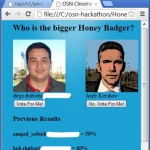Oracle Social Network Developer Challenge: Bezzotech
Posted
by Kellsey Ruppel
on Oracle Blogs
See other posts from Oracle Blogs
or by Kellsey Ruppel
Published on Fri, 12 Oct 2012 17:51:40 +0000
Indexed on
2012/10/12
21:43 UTC
Read the original article
Hit count: 478
/Oracle OpenWorld
Originally posted by Jake Kuramoto on The Apps Lab blog.
I’ve covered all the entries we had for the Oracle Social Network Developer Challenge, the winners, Dimitri and Martin, HarQen, TEAM Informatics and John Sim from Fishbowl Solutions, and today, I’m giving you bonus coverage.
Friend of the ‘Lab, Bex Huff (@bex) from Bezzotech (@bezzotech), had an interesting OpenWorld. He rebounded from an allergic reaction to finish his entry, Honey Badger, only to have his other OpenWorld commitments make him unable to present his work.
Still, he did a bunch of work, and I want to make sure everyone knows about the Honey Badger. If you’re wondering about the name, it’s a meme; “honey badger don’t care.”
Bex tackled a common problem with social tools by adding game mechanics to create an incentive for people to keep their profiles updated. He used a Hot-or-Not style comparison app that poses expertise questions and awards a badge to the winner. Questions are based on whatever attributes the business wants to emphasize.
The goal is to find the mavens in an organization, give them praise and recognition, ideally creating incentive for everyone to raise their games.
In his own words:
There is a real information quality problem in social networks. In last year’s keynote, Larry Elison demonstrated how to use the social network to track down resources that have the skill sets needed for specific projects. But how well would that work in real life? People usually update that information with the basic profile information, but they rarely update their profiles with latest news items, projects, customers, or skills. It’s a pain.
Or, put another way, when was the last time you updated your LinkedIn profile?
Enter the Honey Badger! This is a example of a comparator app that gamifies the way people keep their profiles updated, which ensures higher quality data in the social network. An administrator comes up with a series of important questions: Who is a better communicator? Who is a better Java programmer? Who is a better team player? And people would have a space in their profile to give a justification as to why they have these skills.
The second part of the app is the comparator. It randomly shows two people, their names, and their justification for why they have these skills. You will click on one of them to “vote” for them, then on the next page you will see the results from the previous match, and get 2 new people to vote on. Anybody with a winning score wins a “Honey Badge” to be displayed on their profile page, which proudly states that their peers agree that this person has those skills.
Once a badge is won, it will be jealously guarded. The longer your go without updating your profile, the more likely it is that you will lose your badge. This “loss aversion” is well known in psychology, and is a strong incentive for people to keep their profiles up to date. If a user sees their rank drop from 90% to 60%, they will find the time to update their justification!
Unfortunately, during the hackathon we were not allowed to modify the schema to allow for additional fields such as “justification.” So this hack is limited to just the one basic question: who is the bigger Honey Badger?
Here are some shots of the Honey Badger application:
Thanks to Bex and everyone for participating in our challenge. Despite very little time to promote this event, we had a great turnout and creative and useful entries. The amount of work required to put together these final entries was significant, especially during a conference, and the judges and all of us involved were impressed at how much work everyone was able to do.
Congrats to everyone, pat yourselves on the back.
Stay tuned if you’re interested in challenges like these. We’ll likely be running similar events in the not-so-distant future.
© Oracle Blogs or respective owner

